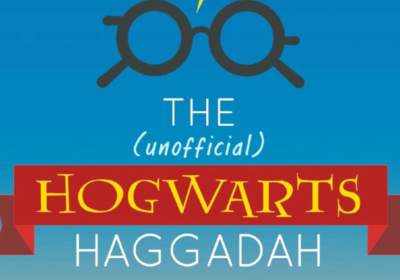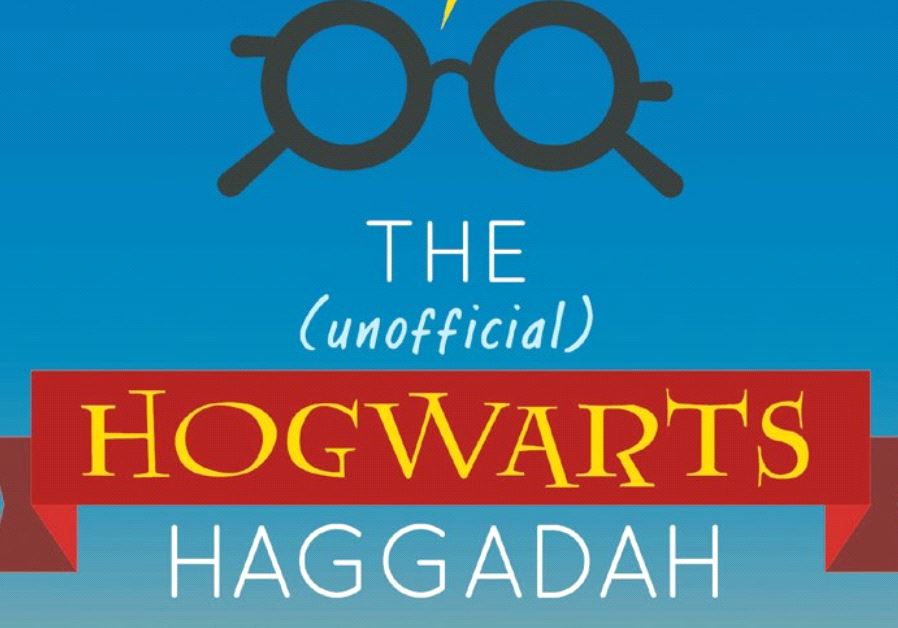Other than the mention of holidays like Christmas and Easter in the Wizarding World, J.K. Rowling avoided the topic of religion in her “Harry Potter” books. After all, the complexities and controversies surrounding faith would have felt a little out of place in a young adult series and would have bogged down the momentum of the plot. Nevertheless, the connections between Harry Potter’s magical world and organized religion offer an endless supply of fascinating speculations (even outside the Harry Potter subreddit).

This wasn’t lost on Rabbi Moshe Rosenberg, who recently published the perfect Passover companion for “Potter” fans, “The (unofficial) Hogwarts Haggadah.” He expertly draws comparisons between events and characters in the books to the laws and customs of the holiday, including a “Rowling-ized” version of Chad Gadya.
In other words, it’s the perfect prize for the person who finds the Afikomen this year. (Quick Tip: If you’re a wizarding parent, make the Afikomen unsumonnable so your kids can’t simply use ‘Accio’ to find it, unless, of course, they’re underage and can’t use magic in the house anyway. Wait, is magic considered muktzeh?)
When I first heard of the book’s existence, the possibilities – and questions – were endless. It brought to mind feverish images of a mini matzah-baking operation by the ever-efficient Hogwarts house elves or Honeydukes unveiling a special rack of overpriced kosher for Passover magical candy in for the Jewish residents of Hogsmeade. And there are some serious questions to consider: Can I use a dragon egg for the seder plate? Is there a Sandy Koufax-esque Quidditch player who refused to play on the yuntif? And finally, and most importantly, do Jewish wizards watch the “Rugrats” Passover special like the rest of us Muggles?
Luckily, I didn’t need to use any Veritaserum (apologies to Dolores Umbridge and Rita Skeeter) or Occlumency skill to coax some festive answers out of the book’s author. Read on as he discusses how a New York rabbi (of all people) got caught up in the saga of The Boy Who Lived and why buying matzah from a Merperson is ill-advised…
Josh Weiss: This is your second book that draws parallels between the “Harry Potter” novels and Judaism (the first being “Morality for Muggles: Ethics in the Bible and the World of Harry Potter”). What drew you to the series in the first place?
Rabbi Moshe Rosenberg: I have a running dispute with my very talented daughter as to whether I was introduced to HP by her or an assistant I had in school. (Guess which one she says…) Whoever did the honors, I was hooked by the incredible balance between humor and drama, the spot-on understanding of people, and the fantastic Good vs. Evil plot. Oh, yes, and there was magic too.
JW: What was the most shocking or surprising thing you learned about Harry’s connection to Passover when writing this book? Similarly, what was the most fun thing about writing the book?
RMR: Probably the most surprising thing was how many parallels I was able to see just from flipping through the Haggadah text. It was important to me to have commentary in every major section, and I succeeded with relative ease.
A close second was to find that one of the most key phrases in the books is actually straight out of the Bible. (No fair asking which – read the essays like everyone else.) The most fun thing has probably been the way my own children have become invested in the book, and it has turned our whole family into an editorial and social media team.
JW: While this Haggadah draws from all seven of the “Harry Potter” books, do you have a favorite and did one have a particularly heavy bearing on the content of this book?
RMR: I don’t know that I have a favorite, but the Haggadah does draw heavily on the seventh book [“Deathy Hallows”] in particular, because that is where a lot of the messages and themes truly come together to make their lessons clearest. My one song parody in the Haggadah is of Chad Gadya, and looks back with the lens of the conclusion of the series to all the steps that led there. So, if you haven’t read all the books or at least seen the movies, beware of spoilers!
JW: Magic isn’t foreign in the Jewish tradition, with supernatural beings and rituals outlined in Kabbalistic texts and even the Torah itself. And magic is certainly present in the story of the Jews leaving Egypt, when it comes to Pharaoh’s sorcerers who could recreate some of Moses’s divine conjury. How did you reconcile Judaism’s description of magic with Rowling’s own brand of it when pursuing this project?
RMR: I don’t actually focus so much on the magical aspects of the “Harry Potter” books. To me, what makes these books resonate with so many people across so many walks of life are the human themes infused in the stories: parent-child relationships, student-teacher relationships, friendship, class differences, and so on.
J.K. Rowling is so skilled at illustrating these ideas, and in my writings, I seek to highlight the parallels between the “Harry Potter” themes and Jewish themes. I actually see Hogwarts as an English boarding school with some bells and whistles, and I feel that even J.K. Rowling treats the magic with a certain degree of tongue-in-cheek, going for hilarity in jinxes as often as drama in spells.
JW: In the book, you amusingly state that goblins may have an issue with the idea of selling one’s chametz before the holiday. Are there any other magical creatures in the Wizarding World whose binding codes of operation would complicate the already complex world of Jewish law within the context of Passover?
RMR: Well, certainly the Merpeople would find it difficult to follow the stringency of some to keep even fully baked Matzah from contact with water! And one wonders what to do for a house elf like Winky who prefers servitude to freedom.
JW: Who is your favorite Harry Potter character and what Jewish value do you think they most exemplify?
RMR: If you put my back to the wall, I would say Lupin because of his patience and because he is willing to do the right thing, even in a world where no good deed goes unpunished.
JW: What added dimension do you think the book will bring to the ritual of the seder, particularly for die-hard Potter fans?
RMR: I think it brings a dimension of fun, of course, but also hopefully assurance that wisdom and value can be found in everything we love, not just in the conventional places.
Josh Weiss is a senior at Drexel University in Philadelphia, studying Communications with a concentration in Public Relations.

